General
EfD-Mak Holds Policy Dialogue on L. Victoria’s Hydrology, Water Quality and Livelihoods
Published
5 years agoon
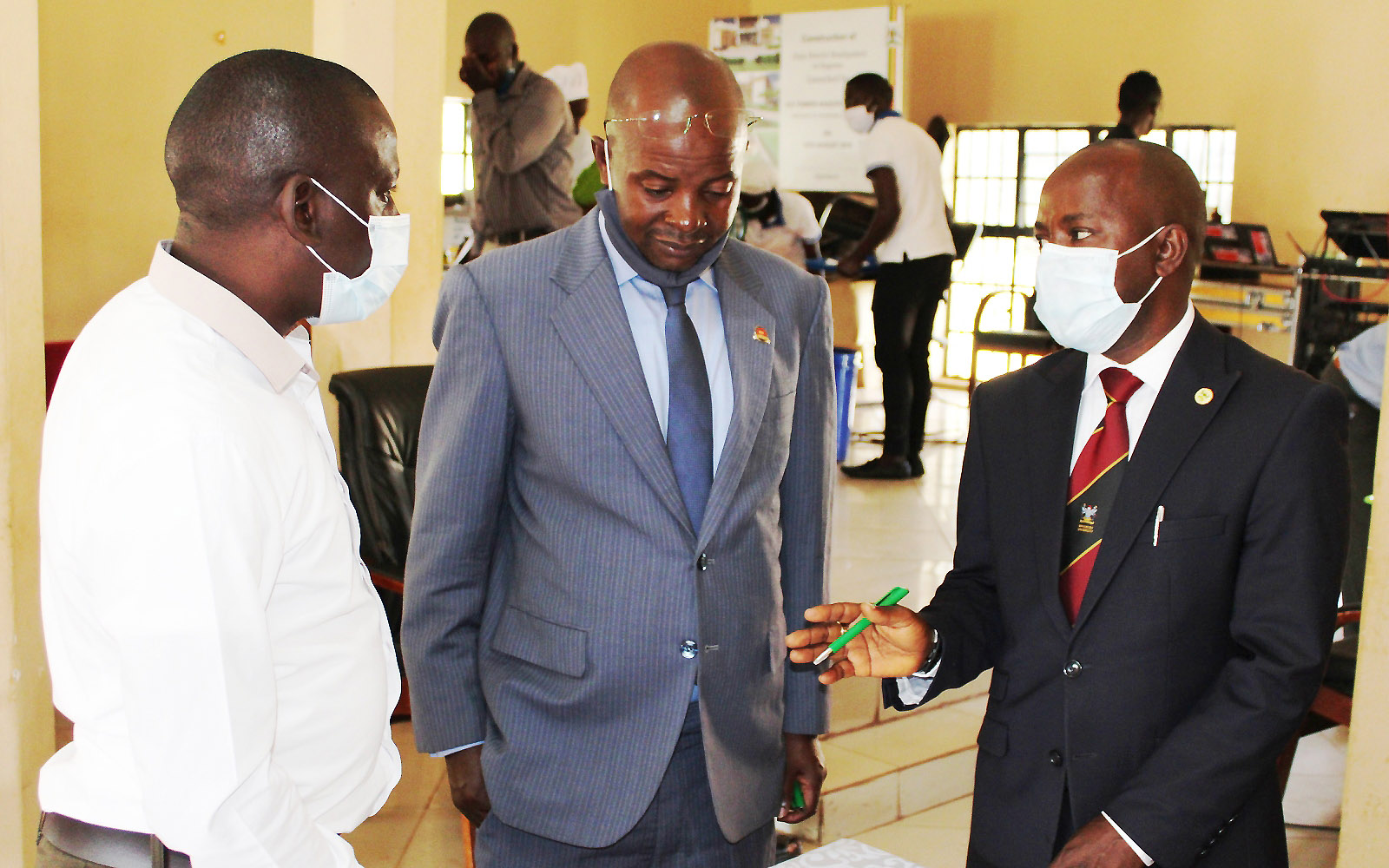
Environmental economists from the Environment for Development initiative (EfD-Mak) Centre on 26th August 2020 held a policy dialogue with Jinja District Local Government officials on the theme, “Lake Victoria’s Hydrology, Water Quality and livelihoods”.
The workshop held at the Jinja District Council Hall attracted about 40 participants including the Resident District Commissioner (RDC), Chairperson Local Council Five (LCV), District Natural Resources’ Officers, officials from the Environmental Police Unit, Civil Society Organizations and the Private sector among others.
The objective of the meeting was to discuss and brainstorm on the status of the environment more especially the rising water levels on Lake Victoria and the rivers within the district, challenges faced in the management of the natural resources and identify possible solutions to mitigate environmental degradation.
In his welcome remarks, the LCV Chairman Titus Kisambira said Jinja as an industrial district and city has had a number of environmental challenges with most of the industrialists allocated land tittles near the lake and investors encroaching on more land in the wetlands leading to adverse effects.
The Chairman said, the construction of industries in the wetlands and near the lake has affected the environmental pattern and water runways leading to overflooding and floating islands during heavy rainfall.
Mr. Kisambira reported that the district council took a decision and wrote to all industrialists asking them to vacate land allocated in the wetland. .
“The challenge was with us also, some of the industrialists would run to politicians to help them get titles but we have taken a firm decision as council and instructed the technical team like the land officers to prepare land titles that were acquired in the wetlands and those near the lake for cancelling immediately and all constructions made in the wetlands be destroyed to save the environment,
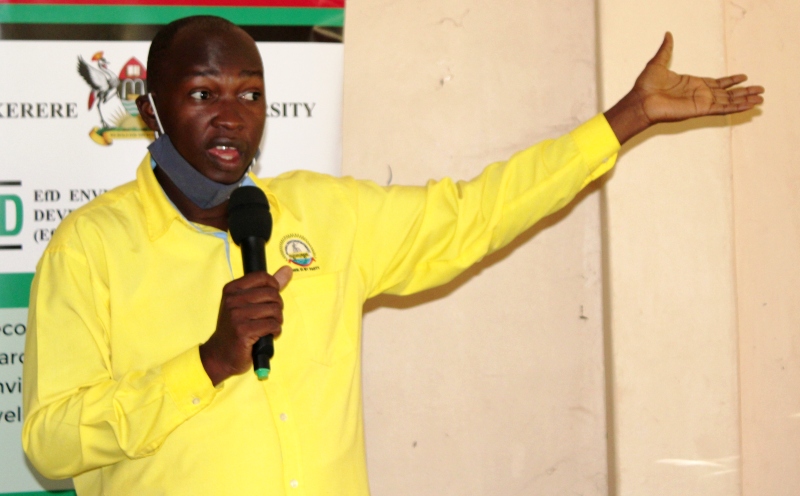
At times we are let down by the technical people in terms of implementation but for us as a council we took it as a decision that whatever was done in the wetland is reversed. We have a lot of gazzetted land which is not near the lake in Budondo, Mafubira, Busedde and Butagaya and we have advised industrialist to come and we give them land elsewhere so that they do not take away the factories but also conserve the environment”, Mr. Kisambira stated.
While opening the dialogue, the Acting RDC Lt. Alfred Musoke acknowledged that local governments were partly to blame for environmental destruction in the district..
“There are many factories near the lake now swallowed by the lake and they were constructed after acquiring the land titles yet the policy is clear that no one should get a land title in the swampy area. So people got the land titles fraudulently and the government should come in and cancel the titles because they are destroying the environmental pattern.
All districts have environmental officers and before any construction is made, there is an environmental impact assessment report. So we wonder how those reports read because if they were done properly they would not be approved.
We should revise everything and see that the environment is protected. Very many houses in the islands have been swallowed by water. Recently the President came here because of the large floating islands had been broken up and disintegrated by people and when they moved, they entered our turbines leading the entire country to experience a total blackout when the President was expected to address the nation on the COVID-19”, Lt. Musoke reported.
As a district, the RDC said environmental officers have been sensitized on their roles and the need to enforce the law.
He said recently, environmental police did patrols on landing sites where soil had been dumped and ordered perpetrators to remove the soils as they block the movement of water.
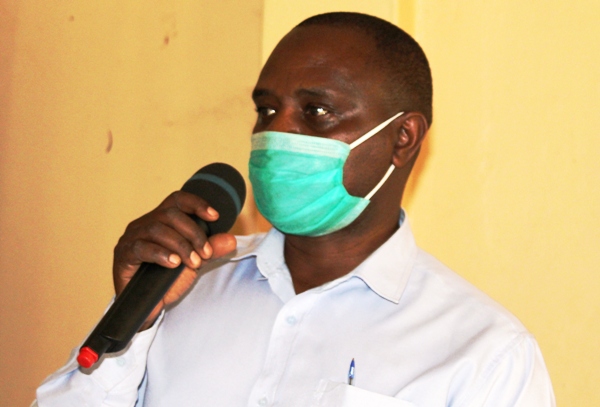
He called upon participants to openly come up to condemn environmental degraders to protect the environment.
As head of security in the district, he condemned acts of security (UPDF and police) being used to protect destroyers of the environment saying, his office was open to receive reports of such acts for immediate intervention.
Delivering the Keynote address, the Senior Environment Officer, Jinja district Mr. Maganda Moses appreciated Makerere University for this initiative saying, it was the first of its kind in Jinja that revives and brings to light a sector that is still struggling in the country in terms of budgeting and whose impact trickles down to the Local Governments and Lower Local Governments.
Mr. Maganda commended the selection of participants for the meeting on grounds that it speaks volumes on how important they are in contributing towards the existing policies on Environment and Natural Resources in the country.
Maganda said Uganda is endowed with Lake Victoria, Africa’s largest freshwater lake and the second largest in the world by surface area measuring 68,800km2, River Nile, the longest river in the world and one of the 7 wonders of the world stretching 6,650km crossing 10 countries, streams, wetlands, a beautiful landscape with Mountains, undulating hills and valleys, Minerals in different parts of the country, the oil in the Albertine region, a rich biodiversity, and a favourable climate with an annual temp. of 26 degrees Celsius.
The environmental Officer noted that Uganda has the best policies but the problem is the implementation. He called for the strengthening the institutional capacity to implement the RIO conventions, focusing on the three conventions, UNFCCC, UNCBD, UNCCCD.
“Kenya is a step ahead in implementing the three conventions, for instance being largely a desert, Kenya is shifting from the use of biomass as a source of energy and has subsidized on the costs of natural gas so that it’s affordable to all. They have also considered importing timber from neighboring countries and keeping their biomass intact.
In Kenya, the Law banning Kaveera was enacted in 2017 following a benchmark trip made by Kenya to Uganda a year before. We enacted a law on the ban of kaveera in 2009, and ever since we have been in battles with different stakeholders on the implementation of the ban, to-date it has not come to pass. On the contrary, the Kenyans are jubilating having succeeded with the ban in a space of 2 years. The manufacturers of kaveera from Kenya were actually warmly welcomed in Uganda.
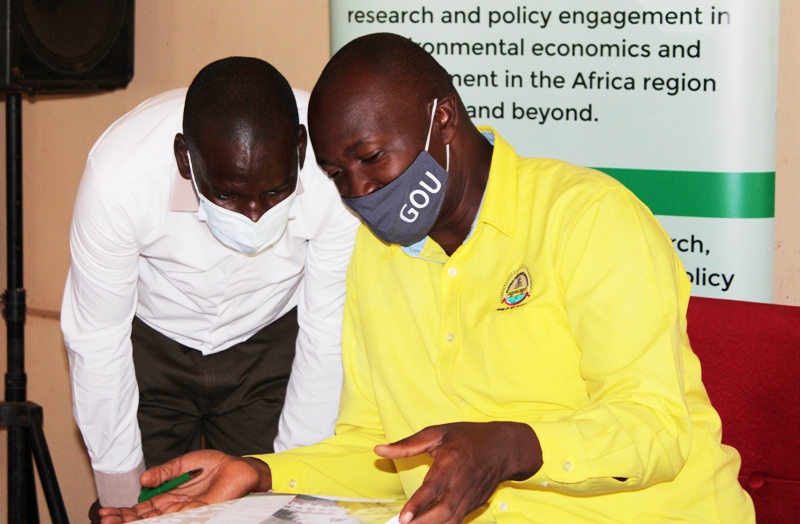
But we know how much damage kaveera can has cause on our water bodies, we know tonnes of kaveera are always harvested from Nakivuubo channel and other water channels on a daily basis and all this most likely ends up in the Lake.
In Kenya, the law on protection of wetlands, riverbanks, Lakeshores, is enforced to the dot. Most of their wetlands are intact, illegal structures on the river banks have been demolished and re-planning of such areas has taken root.” Mr. Musoke stated
He told participants that as they focus on the day’s theme, they should also focus on what their contributions have been towards the existing policies on Natural Resources, how far they have been successful, where they have failed as Government, including other stakeholders such as CSOs, Academia etc , and the possible proposals for Review where necessary.
Mr. Maganda reported that this year’s theme for celebrating World Environment Day was ‘Time for Nature, with a focus on its role in providing the essential infrastructure that supports life on Earth and human development‘, that was celebrated on the 5th of June 2020 in Colombia.
He said Uganda adopted the theme ‘Nature is speaking, Listen’, and because of the COVID-19 Pandemic, on the 5th June, 2020 an online discussion was held to celebrate the day, where the focus was on the food we eat, the air we breathe, the water we drink and the climate that makes our planet habitable, all coming from nature.
He reckoned that there would not be any other better description of the recent events that have devastated nature and humanity and threatened the livelihoods of millions of people dependent directly and indirectly on Lake Victoria than the theme itself.
The environmental officer said the volume of water in Lake Victoria has risen before and available data shows that the ever highest recorded increase was 2.5m between 1960 and 1964 though the impact to livelihoods was not as significant as it is today.
The rains that started on the 1st October 2019 he said, surpassed the last ever recorded increase and consistently went up from the 12m to the current highest level of 13.32m as of 30th April 2020.
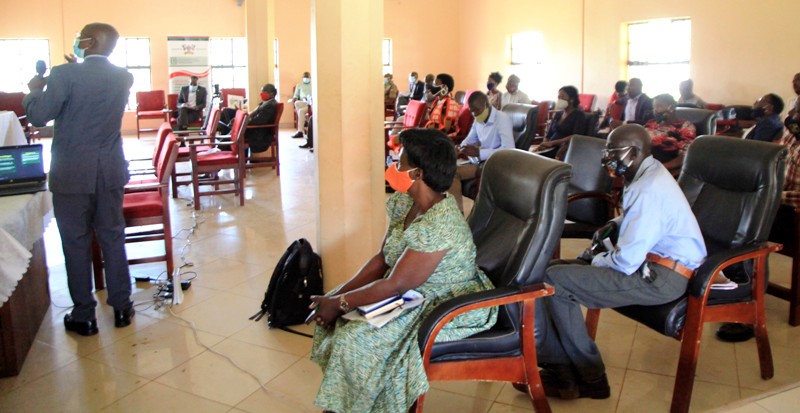
“Of course, we have seen glaring negative impacts of the rise on people’s livelihoods, settlements, animal habitats, water quality, among many others. The population explosion around the Lake Victoria basin largely accounts for this.
Today, there’s a high affinity for land along the buffer zone of Lake Victoria, there are; numerous ungazetted landing sites, unplanned settlements, industrial hubs, illegal farming activities, non-permitted recreation facilities, and unregulated sand mining activities.” He said.
Mr. Maganda attributed the rising water levels to two major causes;
He said Global Warming is the primary cause of the current water level rise (Extreme heat events experienced on earth as a result of the depletion of the ozone layer) while human activities like, charcoal burning, cutting down trees, pollution from industries, CFCs from old fridge’s, have contributed to an increase in the atmospheric concentrations of heat trapping gasses and caused the planet to warm by 1.4 degrees Fahrenheit. The rising temperatures are warming the ocean waters, which in turn expand and cause global sea level rise.
Secondly, he said are the glaciers and ice caps that are shrinking at a faster rate in response to rising temperatures adding water to the world’s oceans and in turn other water bodies.
“So where we have no direct control over such significant causes; how can we best weigh the costs and risks of accommodating the impacts; retreating from them? Or are we instead trying to defend the properties and infrastructure with protective measures.
As a country, we have clear safeguards within the existing environmental legislation; The NEA 2019 is clear on protection of fragile areas. The National Environment (Wetlands, Riverbanks and Lakeshores management) Regulations 2000 provides for the buffering of our water bodies, lakes, 200m, rivers 100m, small rivers 30m, streams 10m. Therefore, to what extent have we referred to these regulations? He asked.
At a global scale. Maganda reported that rising waters have led to destructive and devastating effects on marine habitats, erosion, wetland flooding, and agricultural soil contamination. In Jinja and most of the neighboring districts he said, Islands have either been fully or partially submerged. e.g at the source of the Nile; Agricultural land and crops have been lost; Peoples settlements have been invaded with the rising waters and forced the affected communities to migrate.and; Factories like Sunbelt, Skyfat, LIU, Agromarines, Keswhala industries have all been flooded and are counting losses.
He further observed that Recreation facilities like Rumors, Sailing club have all been flooded; Landing sites and beaches have adversely been affected by the rising waters and it this is evident in Ripon village landing site, Masese Landing site, Wanyange and Wairaka landing sites. The beach in Wairaka is no more. In addition, the breeding ground for the aquatic life washed downstream. and lastly, we had Uganda’s Hydro-electricity production dam at Nalubaale suffering a technical set back when a big mass of land moved downstream and clogged the power system leading to a total power shutdown.
Highlighting on the challenges Mr. Maganda said first, there’s need to acknowledge the fact that there’s substantial damage that has been caused on the Natural Resources and not until when they realize the mistakes made over time as a country then shall we move forward.
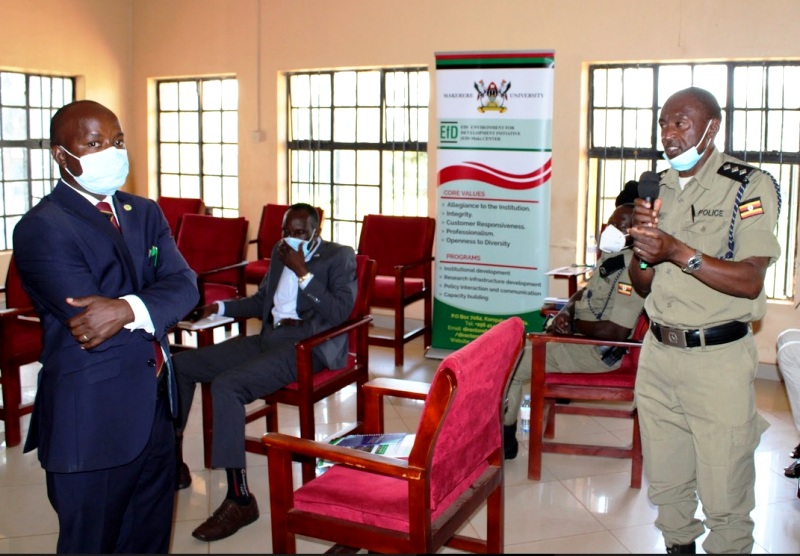
He said that there is also need to acknowledge the fact that much as there are several challenges facing the environment and natural resource sector, several strides have been made but there are many gaps in the existing policies and legislation and emerging issues like oil and gas, and these have triggered new legislation in particular to address environmental concerns for example, Review of the NEMP, in 2019 after over 15 years in existence, Review of the NEA 1995, now the NEA 2019, Presentation of the National Climate Change Bill, 2019 and now before parliament, Review of the National Wetland Policy, 2018 in a bid to safeguard the wetland resources in the country and Review of a number of Regulations in the environment sector e,g the National Environmental Audit Regulations.
He proposed the need for strong policies that will ensure that value is attached to natural resources noting that many of fringe wetlands, forests, have no economic value attached to them and this has always made it hard to convince policy makers especially at local government level to preserve these resources in the face of structural development.
He also proposed the need to ensure total respect for the fragile areas especially the River banks, Lake shores, and forest reserves siting Section 56 of the NEA 2019 refers to declaration of Special Conservation Areas in the country. The Kalagala-Itanda Offset area in Butagaya and Budondo and Kalagala on the Western and Eastern banks respectively of the Nile happens to be the first area under the Act to be declared a SCA and many more areas to be declared as so and exclusively be conserved.
The environmental officer further recommended the need to ensure strong co-ordination with other MDAs so that Environmental Concerns are clearly addressed e.g, titling of fragile areas like wetlands as purely a coordination gap with the different MDAs.
He also expressed the need to cover the gap that exists on how to prevent conversion of forest land or wetlands on private land and that anybody who owns land that has such a resource should be bound to exclusively protect it and not to convert it.
Mr. Maganda also noted that there is lack a clear and direct fund in Local governments to exclusively protect water bodies and yet local governments play a pertinent role in supervision and monitoring of compliance by the adjacent communities. He reported that LVEMP as a running project for the management of Lake Victoria and the Nile Basin Initiative that has always focused on the Nile River at policy level have played a role in empowering LLGS hence LGs need to be directly supported financially with a special fund to protect these resources.
Physical planning, he said, remains an important pillar in planning, gazetting, managing and conserving fragile areas and green spaces. The physical planning Act 2019 emphasizes taking into consideration the Environmental concerns/aspects when drawing Physical plans of particular areas. By strengthening physical planning, he noted it is possible get rid of the development scenario the country is currently embroiled in where it’s a developer to decide where to put up an industry as opposed to government planning for industrial parks or industrial hubs.
He also proposed the need to highlight and strengthen the polluter pays principle so that a developer who pollutes is responsible for paying a fee to government commensurate to the amount of pollution they have introduced into the environment. This he said is still very weak and needs to be re-emphasized.
Last but not least, the officer said there should be a deliberate mechanism at Local Government level where strict data capture, monitoring, supervision and reporting is continuously done on the activities taking place around Lake Victoria.
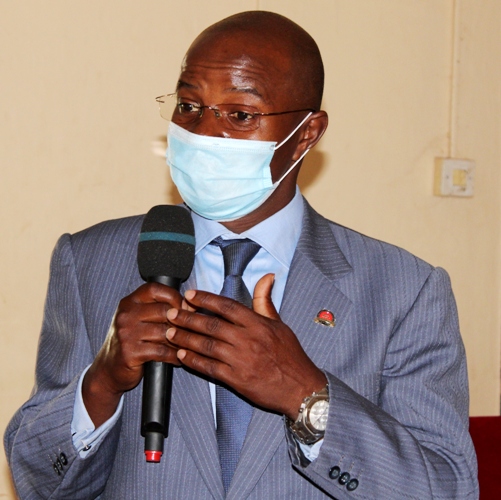
Director EfD-Mak Centre Prof Edward Bbaale said the EfD initiative is a global network of environmental economics research centre with 15 centres across the world in Chile, China, Colombia, Costa Rica, Ethiopia, Ghana, India, Kenya, Nigeria, Sweden, South Africa, Tanzania, Uganda, USA and Vietnam coordinated by the EfD Secretariat, a special Unit at the School of Business, Economics and Law, University of Gothenburg, Sweden.
Prof. Bbaale told participants that the EfD invests in policy interaction not dissemination, Creates interfaces, targets national and Local Government policy level and invests in professional staff development.
On the day’s policy interaction and the theme, Prof. Bbaale said the Lake Victoria Basin (LVB) is a critical transboundary natural resource, underpinning the economy and livelihoods of the population, acting as a waste repository and provides food, energy, irrigation, drinking water, tourism and transportation to the economy.
He said that being the source of the White Nile, the lake also supports the livelihoods of Egypt, Sudan and South Sudan and is the primary modulator of the region’s climate. Despite its importance, Prof. Bbaale said, the LVB has undergone intense environmental degradation for decades, resulting in significant ecological and economic challenges.
He highlighted that rapid population growth, agricultural expansion, urbanization, and industrialization have mounted extreme pressure on the lake and its basin’s ecosystems leading to the degradation of lands, and the loss of wetlands and forests.
Speaking on human activities and degradation the director said insufficient monitoring and weak enforcement of regulations on illegal- and over-fishing activities have reduced fish stocks, which threaten crucial livelihoods and food security among others.
“Climate change has also affected the basin as temperatures have consistently increased between 0.1°C and 2.5°C, based on historical data from 1920 to 2013. The LVB and its inhabitants are vulnerable to the increasing effects of climate shocks, which would likely exacerbate its environmental problems.” Prof. Bbaale reported
He said, water levels in the Lake are influenced by direct rainfall over the lake, runoff from the basin, evaporation from the Lake, and outflows into the Nile, the latter of which is currently controlled by more than one hydropower dam.
The fish stocks according to Prof. Bbaale are threatened by climate change due to warmer waters and pollution induced changes in water quality while increased rainfall increases erosion due to the farming close to the shores and pollution, directly impact the lake’s water quality.
The changing temperatures according to the Director, introduce disease vectors and increase the risk of malaria and other vector-borne diseases for the basin’s human population and that during the period of late January 2020, the effect of Lake Victoria bursting its banks started to be felt with several landing sites and settlements damaged by floods.
This, the professor notedhas left almost half a million people homeless and property worth billions of money had been lost in Uganda, Kenya and Tanzania.
Prof. Bbaale attributed Lake Victoria’s Hydrology change to mainly three causes namely Climate change, lack of regional consensus on a well-coordinated policy of regulating Lake Victoria inflow and outflow and Lake Sedimentation due to catchment degradation and Buffer zone encroachment.
On livelihood impacts of changes in Lake Victoria Eco-system. Prof. Bbaale said there is declining fish biomass, catch and exports, impact on infrastructure especially the Hydropower generation, water transport and reduced business activity along the landing sites, poverty and unemployment plus high crime risks.
Report compiled by: Jane Anyango, Communication Officer, CAES
You may like
General
Special Exam Results -Diploma in Performing Arts 2025/26
Published
2 days agoon
June 28, 2025By
Mak Editor
The results for the 2025/2026 special entry examination for the Diploma in Performing Arts held on Saturday 17th May, 2025. Candidates who scored a final mark of 50% and above passed the Examination and have been recommended to the university’s Admissions Committee for consideration.
General
Mature Age Scheme Exam Results for 2025/2026
Published
3 days agoon
June 27, 2025By
Mak Editor
The Office of Academic Registrar, Makerere University has released full results for the Mature Age Entry Scheme Examinations for the Academic Year 2025/2026 held on Saturday 14th December, 2024.
The Candidates who scored a final mark of 50% and above passed the examination and have been recommended by the Pre-Entry & Mature Age Committee to the University’s Admissions Board for Consideration.
The Aptitude Exam Results for 2025/2026 Academic Year released in February 2025 can be found here.
General
Call for Application: 2025 SNRM session 4 Summer School
Published
4 days agoon
June 26, 2025By
Mak Editor
Context:
Natural resources in Africa are being depleted at an alarming rate due to several factors, including unsustainable human activities, climate change, and population growth. A primary condition of sustainable development is to ensure that the pressures do not exceed the environmental limits, and that demand for the resources does not exceed levels that can be sustainably provided by nature. Therefore, there is a pressing need for transformative, systems-thinking approaches and tools that can tackle the diverse challenges facing these systems. In Africa, this need is compounded by a lack of data and monitoring, which significantly hinders sustainable decision-making.
Investing in young scientists who are committed to take lead in sustainable management of Africa’s natural resources is very important. Capacity building of young scientists will enhance their knowledge and skill on sustainable natural resources and their involvement for implementation of the sustainable development goals (SDG’s) in Africa. To this effect, SNRM summer schools have been implemented in three sessions in 2019, 2020, and 2022 with support from Volkswagen Foundation; to build a critical mass of skilled and competent young natural resource scientists in Africa through training, capacity building and mentorship. Session 4 (2025) will target competent young scientists (MSc and PhD students) in Africa and Germany to further develop their knowledge and skills in systems thinking, advanced data collection and analysis, and application of emerging digital technologies such as Artificial Intelligence (AI), machine learning (ML), internet of things (IoT), and embracing transdisciplinary approaches. In addition, we include an ideation workshop where students can work on real problems to come up with solutions for sustainable transformations in natural resource use.
Organizers: Leibniz Universität – Hannover (Germany), University of Antananarivo, University of Abomey Calavi (Benin), Makerere University (Uganda), University of Ghana (Ghana), University of Parakou (Benin), The Technical University of Kenya, with financial support from the Volkswagen Foundation (Germany).
Venue and dates: Nairobi, Kenya, 16-28 November 2025
Target: MSc and PhD students, early in the program of less than 35 years of age from any university/research institution in either sub-Saharan Africa or Germany with an interest in natural resources management.
Participants and Scholarships: The course is fully funded and open to 20 MSc and PhD students from Africa, and 5 from Germany. Funding will cover the costs of air ticket, accommodation, meals, visa, and transportation. However, participants will cover the cost of their travel health insurance.
Topics
SNRM Summer School Session 4: Transformative pathways in biodiversity management and conservation.
This summer school is designed to deliver four modules over a two-week period. The modules are designed to enable the students to acquire new ways of designing data collection protocols and analysis for transformative sustainable natural resources management.
Module 4.1: Data collection I
Skills in data collection for a transformative and sustainable management of natural resources (water, wildlife, forest, land, livestock, crops) monitoring and data collection techniques; remote monitoring tools, earth observation system data, e.g. satellite data sources, LIDAR, and UAV aerial images. Collect and analyse In-situ data on biotic and abiotic parameters, map and analyse data using R or Google Earth Engine, field data collection and retrieving data from online databases.
Module 4.2 Data management and processing
Introduction to tools and methods of managing large and diverse data sets of natural resources such as time series, spatial, directional, and multivariate data. Practicals will include data storage, organization and conversion into various formats using databases such as PostgreSQL and statistical programming software such as R and Python; scripts.
Module 4.3 Ecological monitoring, modelling and management
This module aims to teach participants how to anticipate and validate trends that can be observed in various ecosystems. Lectures include ecological monitoring and its design; population monitoring studies; metrics in population monitoring; methods for monitoring and assessing marine ecosystems; human ecology to socio-ecological systems; climate change impact of ecosystems; suitability assessments; overview of the principles underlying wildlife monitoring and prediction systems for climate change adaptation. Practicals will include field data collection (individual and group); ecological data analysis using R or PAST; modelling and experiencing the behaviour of complex systems using Vensim.
Module 4.4 Natural habitat restoration ideation lab
This module is designed to spur students’ innovation and creativity, and to help students comprehensively identify interdependencies across the 17 SDG goals. Participants will be trained on ideation processes for solutions and intervention for transformative natural resource management. They will work collaboratively in small groups on case studies and develop pathways of transformative sustainable natural resource management. Examples of projects include forest (mangrove) ecosystem and habitat restoration, improved technologies for agricultural production, nature-based solutions for improving water quality, and reversing land degradation.
Language: The course will be delivered in English. Participants are expected to be fluent in writing and speaking the English language.
How to apply
Applicants are kindly requested to fill in the application form available from https://snrmafrica.com/ and submit the following documents in English through the system.
- a curriculum vitae (maximum 2 pages)
- a letter of motivation (maximum 1 page)
- a confirmation of university enrolment
- a reference letter from the academic supervisor
- project summary of MSc/ PhD project (1 page including objectives, methodology
and key findings or expected outcomes).
Important dates
Application deadline: 30th June 2025.
Announcement of accepted applicants: 15th August 2025.
Confirmation of attendance by selected participants: 12th Sept 2025.
Summer school held: 16 – 28 Nov 2025.
Further information is available from
The secretariat info@snrmafrica.com
Dr Lydia Olaka lydiaolaka@tukenya.ac.ke
Prof. Dr. Hartmut Stuetzel stuetzel@gem.uni-hannover.de
Trending
-

 General3 days ago
General3 days agoMature Age Scheme Exam Results for 2025/2026
-

 General6 days ago
General6 days agoFreshers’ Joining Instructions 2025/2026
-

 General1 week ago
General1 week agoMastercard Foundation Board pays its inaugural visit to Makerere University
-

 General1 week ago
General1 week agoUVCF Makes Case for HEAC Programme
-

 Natural Sciences2 weeks ago
Natural Sciences2 weeks agoCoNAS Participates in the 2025 National Science Week Exhibition
